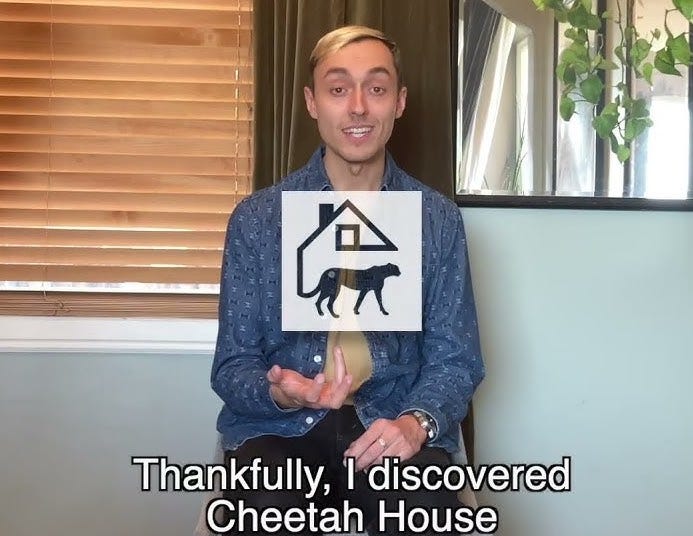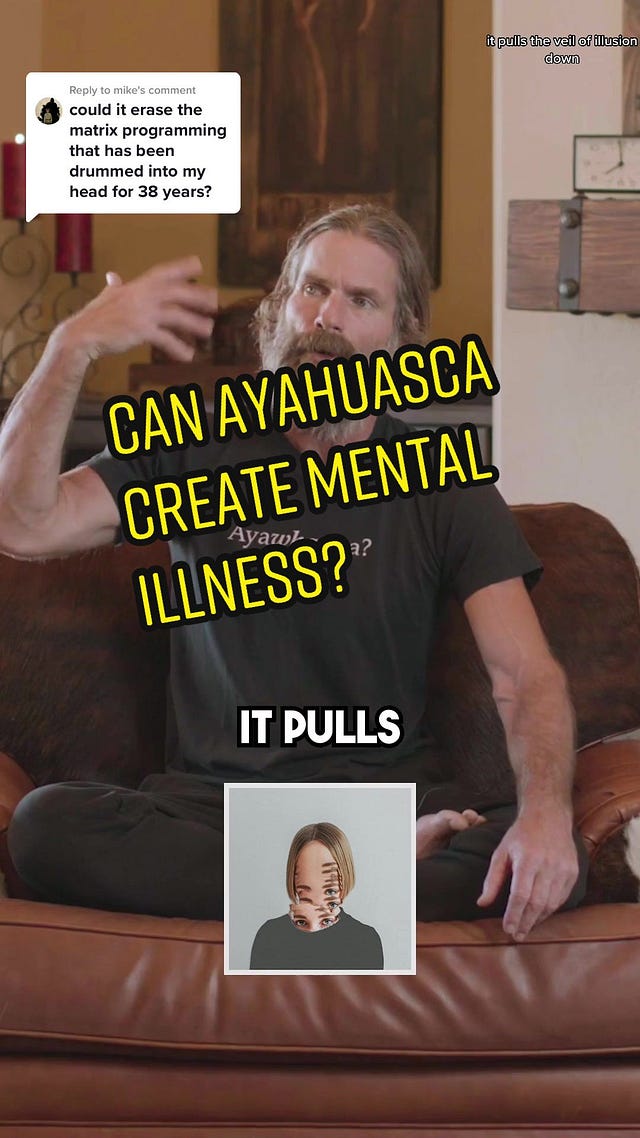We need new clinics to support people with post-psychedelic difficulties
Cheetah House for psychedelics, basically
This newsletter covers some pretty dark material sometimes, and unfortunately there are more stories of harm, abuse, cults and con-artists on the way. But we’re not covering such topics to be sensationalist, and we try to be forward-looking and make useful suggestions to improve safety and ethics in the psychedelic industry and culture.
As I laid out in this piece, there are three main strands to our strategy: Learn, Communicate, Support.
Learn more about harms and what helps people to deal with those harms or avoid them altogether, via academic research and journalism. That involves studying the psychological harms and forms of abuse people can sometimes experience when taking psychedelics. An important part of this strand is trying to connect researchers together, identify research gaps, and either fill them ourselves or support other researchers in doing so. We also encourage and try to support other journalists who are reporting on psychedelic harms - the field is under-reported and most harms and abuses go uncovered.
Communicate these risks – through the media, social media, journal articles, conference speeches, documentaries and so on, so that the general public gets a more accurate idea of both the benefits and risks of psychedelics. This sounds easy but is actually very hard – how do you communicate the risks of psychedelics to 18-25-year-olds, especially such risks as self-medicating alone. This is a challenge for all public health communication – there is scientific evidence, and there is Tik-Tok.
 Tiktok failed to load.
Tiktok failed to load.Enable 3rd party cookies or use another browser
Support –how do we improve the safety net for people who inevitably experience psychedelic harms? Here we’re trying to encourage psychedelic facilitator training programmes to include more and better information on adverse experiences and extended difficulties, so they can better inform clients. We’re also trying to communicate our research on extended difficulties to psychotherapists and psychiatrists outside the psychedelic bubble - so they have more familiarity with the issues clients may present.
What else could improve the safety net? Here’s one idea based on the work of the great Dr Willoughby Britton, the leading researcher on adverse meditation experiences.
Cheetah House for psychedelics…
We get contacted by people in difficulties looking for support. We sometimes interview these people and share their stories, introduce them to others coping with similar difficulties, and connect them to various specialists who might be able to help them.
It’s not easy to refer people to experts. The therapists who I know are really expert in this field – Marc Aixala of ICEERS for example, or Maria Papaspyrou of the Institute for Psychedelic Therapy – tend to be really busy.
We also share lists of integration therapists (like this one from MAPS) – but psychedelic integration therapists can sometimes be quite pro-psychedelic and quite spiritually-minded, and they can see all extended difficulties as ‘spiritual emergencies’.
Not everything is a spiritual emergency, sometimes new psychiatric problems emerge after psychedelics, which might be best treated with medication, at least in the short term.
There is no list of psychedelically-literate psychiatrists who might skillfully support people experiencing post-psychedelic difficulties. So going to a psychiatrist has its risks - they could end up misdiagnosing you, pathologizing your experience and telling you your brain is fucked and you’re going to need medication for the rest of your life.
In other words, providing support to people dealing with post-psychedelic difficulties is quite complicated. Sometimes people need therapeutic support through a process they perceive as spiritual, sometimes people may prefer secular therapeutic support, sometimes they may prefer meds or need specialist support for, say, derealization or HPPD. And sometimes people tell us that what they find most helpful is hearing stories from other people who have been through similar post-trip issues.
I would like better options when referring people for post-psychedelic support and therapy. At the moment, I only know of two specialist clinics for people fealing with post-psychedelic difficulties. There is the ICEERS support centre, founded by Marc Aixala, which offers six free therapy sessions for people dealing with post-psychedelic difficulties. Marc is an expert in this field, and created a cartography of some of the most common types of post-psychedelic difficulties. And there is the psychedelic research team at Charite in Berlin, run by Dr Tomislav Majic. Dr Majic is an expert on psychedelic therapy and harm reduction, and sees clients who require psychiatric treatment for post-psychedelic difficulties.
We will need more than these two places (perhaps others exist?) and I wonder if it’s possible to combine the therapeutic, psychiatric, and peer-led forms of support in one place.
In other words, create a clinic where people struggling with post-psychedelic difficulties can go for consultations and then get referred to the appropriate support – psychotherapy, psycho-spiritual support for spiritual emergencies if that’s how they frame it, psychiatric support and medication if they think it would be helpful, peer support groups, and at the most basic level, information on types of adverse experience and what people say they found helpful.
There is a precedent for this - Cheetah House, set up by Dr Willoughby Britton of Brown University. Dr Britton started researching adverse meditation experiences 15 years ago. Her team published important papers on the types of unusual experiences people report after meditation, which inspired our research at the Challenging Psychedelic Experiences Project.
In 2008 Dr Britton set up Cheetah House, a non-profit to support people experiencing adverse meditation experiences. Its website has pages on particular kinds of difficulties, what they’re like and what people say they found helpful in dealing with them (dissociation, somatic difficulties, anxiety and so on). It also has courses for psychiatrists, therapists and meditation teachers to help them support students experiencing difficulties.
From 2008 to 2013, Cheetah House was also a place where people could stay while grappling with meditation difficulties. For example, someone might have lost their sense of self and couldn’t tell where they ended and the sofa began, another person might be experiencing a Dark Night of the Soul, another having a Kundalini type experience. It must have been quite an intense place, but a lot better than your average psychiatric hospital. But that live-in residence required 24-7 medical support, and that was unsustainble for a small charity.
Now Cheetah House offers online consultations for those experiencing post-meditation difficulties. Payment is on a sliding scale, and is free if can’t afford to pay. Willoughby Britton tells me:
I put up my first 2 years of client payments for start-up costs, and still donate my time as CEO/ED, and care team trainer and clinical supervisor. Now that we have a care team, we have been operating largely on a sliding scale fee for services basis. We are proud that we have not turned away anyone for inability to pay, but our subsidized care is not a sustainable business model.
Although we have had 501c3 nonprofit status for more than a year, and have actively campaigned, we have not yet had any donations from anyone in the meditation industry. The University of Melbourne covers 80% the cost of services for Australians and New Zealanders so that has been our biggest source of support to date (about $25,000).
Isn’t that jaw-dropping? The $8 billion meditation industry hasn’t contributed a single cent to the only support centre for people experiencing the side effects of their product. Come on Headspace, Calm, Deepak Chopra, Sam Harris, Jack Kornfield and others - surely someone can donate to support this project??
Dr Britton recently launched a new project to research psychedelic adverse effects, with the help of Emory University – we very much support this initiative. Could Cheetah House be expanded to also support people having psychedelic difficulties? Dr Britton says it just doesn’t have the capacity.
I’m not a therapist or psychiatrist but I think this sort of clinic needs to exist, and ideally several of them would exist – in North America, South America, Europe, Australasia and Asia. Every US state that legalizes psychedelics should ask– where do people go if they get into post-psychedelic difficulties? All these veterans being encouraged to take psychedelics - where do they go if they get into difficulties?
This is an aspiration rather than a concrete plan, but it seems to me an important part of psychedelic infrastructure which doesn’t yet exist, at least, besides the excellent work of ICEERS in Spain and Charite in Berlin.
After the pay-wall, Shayla Love writes on dissociation, and a big ayahuasca school gets raided by Interpol in Spain and Italy.
Keep reading with a 7-day free trial
Subscribe to Ecstatic Integration to keep reading this post and get 7 days of free access to the full post archives.





